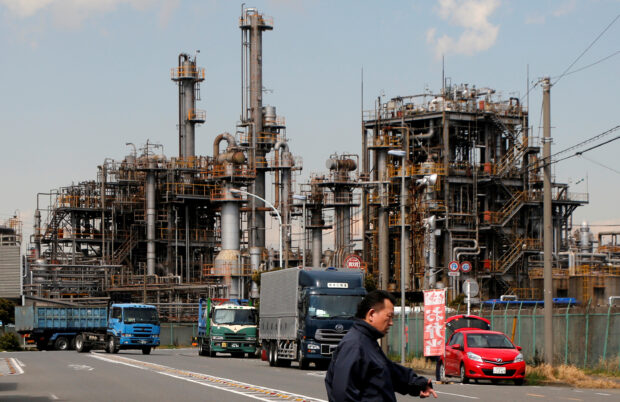
A worker walks near a factory at the Keihin industrial zone in Kawasaki, Japan, March 8, 2017. REUTERS/Toru Hanai/File photo
TOKYO — Japan’s factory activity in March contracted for the 10th consecutive month though the downturn was the least pronounced in four months, helped by softer contractions in output and orders, a private-sector survey showed on Monday.
The final au Jibun Bank Japan manufacturing purchasing managers’ index (PMI) was at 48.2 in March, the highest level since November. That matched the flash reading and was better than February’s 47.2, which marked the fastest pace of contraction in over 3-1/2 years.
The index has remained below the 50.0 threshold that separates expansion from contraction since last June, but conditions for manufacturers were starting to slowly turn up.
“The performance of the Japanese manufacturing sector remained downbeat, though there were signs that the worst of the weakness had passed,” said Usamah Bhatti at S&P Global Market Intelligence, which compiled the survey.
READ: Japan’s Feb factory activity extends decline as conditions worsen
Output and new orders – the two main subindexes contributing to the headline figure – declined yet again albeit at a slower pace than in February.
Export orders decline
Global demand remained a major headwind, with new export orders declining at the fastest pace since February 2023, as business confidence soured in key markets including China and North America, according to the survey.
Delivery times continued to lengthen in March partly due to disruption in the Red Sea and Panama Canal, but the pace was the slowest in six months, the survey showed.
Input inflation was the slowest since February 2021, though high raw material, fuel and transportation costs as well as a weak yen continued to exert pressure on prices. Output inflation accelerated for the first time in nearly a year and hit a three-month high.
READ: Japan manufacturers’ gloom rises, adds to growth pains
Employment rose at the quickest pace since July, while business optimism remained solid on hopes for broad-based domestic and global demand recovery.
The upbeat mood would be welcome by policymakers as Japan shifts away from years of monetary stimulus after its historic decision last month to raise interest rates for the first time since 2007.